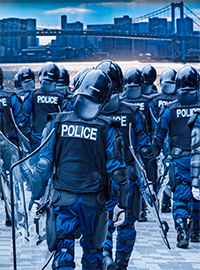| The 'Defund the Police' Dilemma |
 |
|
By Byron York
Wednesday, June 10 2020 |
What seemed like a crazy slogan on the far left – "Defund the Police" – is threatening to become a reality in some cities around the country. On Sunday the president of the Minneapolis City Council announced that a two-thirds majority of the council now supports "ending the Minneapolis Police Department." Council members said they will be "taking intermediate steps toward ending the MPD through the budget process and other policy and budget decisions over the coming weeks and months." The announcement was the latest progress of the growing Defund the Police movement. The slogan appears to create great excitement on the progressive left. But does anyone know what Defund the Police actually means? "We recognize," the Minneapolis council members wrote, "that we don't have all the answers about what a police-free future looks like, but our community does." In fact, there seems to be great confusion about what a police-free future would look like. Recently The Associated Press published a story headlined, "When protesters cry 'defund the police,' what does it mean?" The article discussed some of the political factors at work, and it quoted one anti-police group in Minneapolis talking about "strategically reallocating resources, funding and responsibility away from police and toward community-based models of safety, support and prevention." But the article gave readers no idea what that might actually mean in practice. CNN published an article – "There's a growing call to defund the police. Here's what it means" – that was even less enlightening. Neither discussed what seems to be the basic question of a police-free future: What would happen when a crime is committed? Say there is a murder, which happened 40 times in Minneapolis last year and 492 times in Chicago. Or say there is an armed robbery. Or an aggravated assault. What happens then? Does a social worker go to the scene? Do strategically reallocated resources solve the crime? The Defund the Police movement has grown without seriously addressing that scenario, some version of which is guaranteed to happen multiple times on the first police-free day of the police-free future in any medium-sized or big city. Indeed, a CNN anchor asked the president of the Minneapolis City Council, Lisa Bender, who supports "ending" the police department, "What if, in the middle of night, my home is broken into? What do I call? "Yes, I hear that loud and clear from a lot of my neighbors. And myself, too. And I know that that comes from a place of privilege," Bender said. "Because for those of us for whom the system is working, I think we need to step back and imagine what it would feel like to already live in that reality where calling the police may mean more harm is done." Perhaps Bender has not thought through the implications of her position. Her argument seemed to be that cities should put all citizens in danger rather than fix those areas where there are problems with the police. Some of the Defund the Police movement comes from a 2017 book "The End of Policing," by a Brooklyn College sociology professor named Alex Vitale. In a recent appearance on NPR, he, too, did not seem eager to talk about what his policies might mean for victims of crime. "People ask the question, without police, what do you do when someone gets murdered?" asked NPR's Leah Donnella. "What do you do when someone's house gets robbed? What do you say to those people who have those concerns?" "Well, I'm certainly not talking about any kind of scenario where tomorrow someone just flips a switch and there are no police," Vitale began. "What I'm talking about is the systematic questioning of the specific roles that police currently undertake, and attempting to develop evidence-based alternatives so that we can dial back our reliance on them. And my feeling is that this encompasses actually the vast majority of what police do. We have better alternatives for them." You'll notice there was no answer in Vitale's answer. He continued: "Even if you take something like burglary – a huge amount of burglary activity is driven by drug use. And we need to completely rethink our approach to drugs so that property crime isn't the primary way that people access drugs. We don't have any part of this country that has high-quality medical drug treatment on demand. But we have policing on demand everywhere. And it's not working." Vitale never addressed the serious crime question. And that's important, isn't it? Looking over some of his other interviews, it is amazing how often the question of crime has not come up. But if momentum continues to grow for defunding the police – and certainly if some bold municipality actually tries it – people will want to know what happens if a government defunds the police and crime still happens. And Vitale never said what would happen in the event of a murder. Do social workers show up to solve the crime? What's the "evidence-based alternative"? Byron York is chief political correspondent for The Washington Examiner. |
Related Articles : |
























